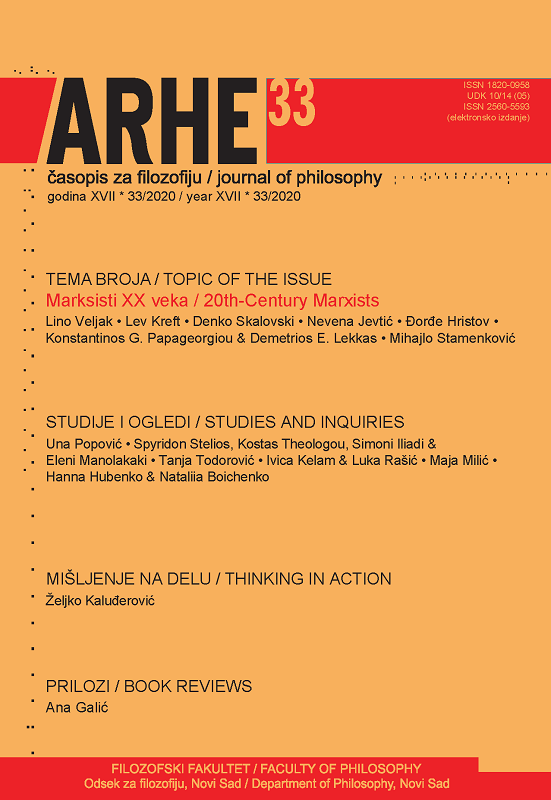ARGUMENT, KNOWLEDGE AND ETHICS: UNDERSTANDING CORE CONCEPTS IN PHILOSOPHY BY AN EMPIRICAL STUDY ON GREEK UNIVERSITY STUDENTS
Main Article Content
Abstract
An empirical study was conducted measuring the degree to which Greek university students’ understanding of core philosophical concepts (that is, ‘argument’, ‘knowledge’ and ‘ethics’) has been shaped by the material taught in the classroom. The extent of this transition from pre-instructional conceptions to textbook formulations has been investigated through the use of a new questionnaire. Findings indicate that generally, students retain their pre-theoretical understanding of these terms. Within this framework, some formal definitions are closer to common sense (e.g. ‘ethics’) and some others aren’t (e.g. ‘knowledge’). Furthermore, the role of intuitions in this process is been evaluated, leading to the ascertainment that previous philosophical encounters seem to play a crucial role in determining actual understanding.
Article Details
References
Baggini, J., & Fosl, P. S. (2010). The philosopher’s toolkit: A compendium of philosophical concepts and methods (2nd edition). UK: Wiley-Blackwell.
Booth, J. (2006). On the mastery of philosophical concepts: Socratic discourse and the unexpected ‘effect’. In J. H. F. Meyer and R. Land (Eds), Overcoming barriers to student understanding: Threshold concepts and troublesome knowledge, 173-181, Oxfordshire: Routledge.
Cato, D. (1987). Getting clearer about 'getting clearer': R. S. Peters and second-order conceptual analysis. Journal of Philosophy of Education, 21, 25–36, https://doi.org/10.1111/j.1467-9752.1987.tb00140.x.
Churchill, L. R. (1999). Are we professionals? A critical look at the social role of Bioethicists. Daedalus, 128, 253–274.
DiSessa, A. A. (1988). Knowledge in pieces. In G. Forman & P. Pufall (Eds.), Constructivism in the computer age, 49-70, Hillsdale, NJ: Erlbaum.
Duke, E. A., Hicken, W. F., Nicholl, W. S. M., Robinson, D. B., & Strachan, J. C. G. (Eds.) (1995). Platonis opera tomus I. Oxford: Oxford University Press.
Goldman, A. I. (2007). Philosophical intuitions: Their target, their source, and their epistemic status. Grazer Philosophische Studien, 74, 1-26, https://doi.org/10.1163/9789401204651_002.
Herzog, A. R., & Bachman, J. G. (1981). Effects of questionnaire length on response quality. Public Opinion Quarterly, 45, 549-559.
Iliadi, S., Theologou, K. & Stelios, S. (2019). Are University Students Who Are Taking Philosophy Courses Familiar with the Basic Tools for Argument? Teaching Philosophy, 42, 3, 197-220. https://doi.org/10.5840/teachphil2019726106
Jackson, F. (1998). From Metaphysics to Ethics: A defence of conceptual analysis. Oxford: Clarendon Press.
Koutoungos, A. (2008). Between the moral and the rational. Athens: Papazissis Publishers.
Laverty, M. (2009). Learning our concepts. Journal of Philosophy of Education, 43, 27–41, https://doi.org/10.1111/j.1467-9752.2010.00753.x.
Lewis, D. (1983). Philosophical papers: Volume I. New York: Oxford University Press.
Locke, J. (1694/1975). Of identity and diversity (Chapter XXVII of An essay concerning human understanding). In J. Perry (Ed.), Personal identity, 33-52. Berkeley: University of California Press.
Meyer, J. H. F. & Land, R. (2003a). Threshold concepts and troublesome knowledge: linkages to ways of thinking and practising within the disciplines. In C. Rust (Ed.), Improving student learning: Improving student learning theory and practice – Ten years on. Oxford: OCSLD.
Murphy, P. K. & Alexander, P. (2008). The role of knowledge, beliefs, and interest in the conceptual change process: A synthesis and meta-analysis of the research. In S. Vosniadou (Ed.), International handbook of research on conceptual change, 583-616. New York: Routledge.
Prinz, J., J. (2007). Empirical philosophy and experimental philosophy. In J. Knobe, & S. Nichols (Eds.), Experimental Philosophy, 189-208. New York: Oxford University Press.
Pust, J. (2019). Intuition. In E. N. Zalta (Ed.), The Stanford Encyclopedia of Philosophy (URL:
Rusanen, Α.Μ., Lappi, O., Honkela, T., & Nederström, M. (2008). Conceptual coherence in philosophy education-Visualizing initial conceptions of philosophy students with self-organizing maps. In B. C. Love, K. McRae, & V. M. Sloutsky (Eds.), Proceedings of the 30th annual conference of the cognitive science society, 64-70. Austin, TX: Cognitive Science Society.
Salkind, N. (Ed.). (2007). Encyclopedia of measurement and statistics. Thousand Oaks, CA: SAGE Publications.
Salzberger, R. P. (1997). Ethics outside the limits of Philosophy: Ethical inquiry at Metropolitan State University. Teaching Philosophy 20(2), 169-191, https://doi.org/10.5840/teachphil199720220.
Sheppard, C. and Gilbert, J. (1991). Course design, teaching method and student epistemology. Higher Education, 22, 229-249, https://doi.org/10.1007/ bf00132289.
Vosniadou, S., & Brewer, W. F. (1992). Mental models of the Earth: A study of conceptual change in childhood. Cognitive Psychology, 24, 535-585, https://doi.org/10.1016/0010-0285(92)90018-w.
Weinberg, J. M., Nichols, S., & Stich, S. (2001). Normativity and epistemic intuitions. Philosophical Topics, 2, 429-460, https://doi.org/10.5840/ philtopics2001291/217.
Wortham, S. (2015). Clearing away assumptions through philosophy and research. Studies in Philosophy and Education, 34, 125–136, https://doi.org/10.1007/s11217-014-9419-2.
